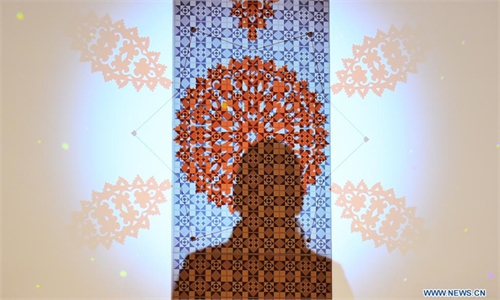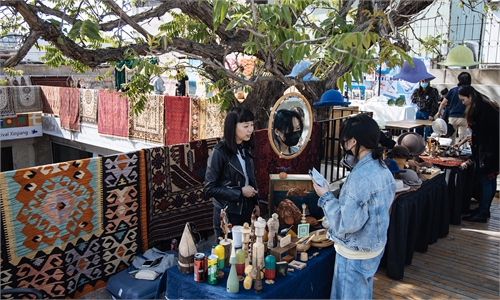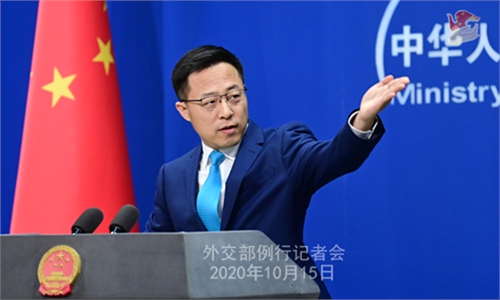IN-DEPTH / IN-DEPTH
Xinjiang secessionists, Western anti-China forces, collude in attacking China
A looming conspiracy
The notorious World Uyghur Congress (WUC), a self-proclaimed "grassroots human rights organization advocating for the Uygurs in China," which is actually a US-funded and directed separatist network, has recently been found to be in close contact with the separatists on the island of Taiwan.
On the evening of April 25, WUC hosted a so-called "Uygur-Han international online video seminar," inviting several Taiwan separatists. As the media reported, their discussion mainly focused on their stand against the governance of the Communist Party of China in order to undermine the unity of all ethnic groups in China under the guise of "human rights."
Dolkun Isa, head of WUC, also delivered a pre-recorded video message to the foundation event of "Taiwan Parliament Group for Uyghur" on April 23, which was founded by a member of Taiwan's legislative authorities Freddy Lim, joined by a group of 30 members from the legislative authorities in the Taiwan region.
In the video, Dolkun Isa said he expected to "visit Taiwan again in the near future."
In Turkey, a court caused public anger among Chinese people for refusing China's extradition request for Abudukadir Yapuquan, a prominent terrorist from the East Turkistan Islamic Movement (ETIM), and further removing judicial control measures and outbound restrictions on him, the Xinhua News Agency reported on April 13.
The ETIM is a terrorist organization listed by the UN Security Council and is recognized as such by Turkey, Chinese Foreign Ministry spokesperson Zhao Lijian said at a press briefing in April. Abudukadir Yapuquan, who has plotted terrorist attacks on Chinese territory many times, is one of the initiators of the ETIM, Zhao noted.
In Australia, the Australian Alert Service, the weekly publication of the Australian Citizens Party, revealed that local anti-China politicians colluded with the East Turkistan Australian Association (ETAA) in defaming China in an article it published online on April 21.
Titled Australian politicians back 'East Turkistan' terrorism apologists, the article pointed out that this terrorist group is "loudly backing the current campaign for Australia to fall in behind its Five Eyes partners the USA and Canada and label China's treatment of its Uygur minority as 'genocide'." Australian authorities should not take ETAA's claims of "genocide" and "persecution" at face value, "but at least demand real proof," the article noted.
Apart from the WUC, ETIM and ETAA, many Xinjiang-related separatist and terrorist groups, under the guise of "protecting human rights" and "safeguarding the interests of the Uygur people," get financial or political support from some countries and regions who have common political interests with the anti-China politicians, said Xu Jianying, a research fellow at Chinese Borderland Research Institute of the Chinese Academy of Social Sciences.
The recent barrage of attacks on China's Xinjiang region in the Western world, for instance, is the result of collusion between Xinjiang separatists and Western anti-China forces in an attempt to defame China, observers pointed out.
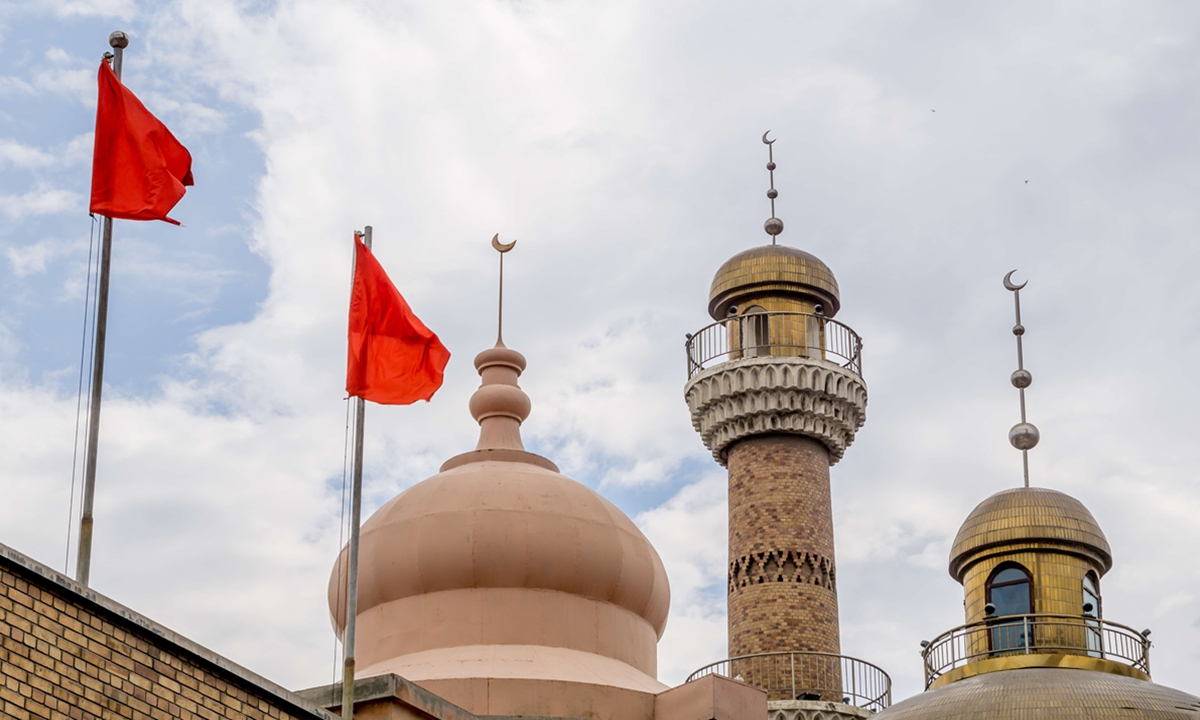
Make waves
Some right-wing politicians in Eastern Europe, together with Xinjiang secessionist forces, have been slandering the Xinjiang region in the past few weeks with lies and rumors including "genocide" and "forced labor."
On 22 April, the Lithuanian Parliament held a human rights discussion that included topics on so-called "Uygurs repressions" in Xinjiang that Lithuania is considering recognizing as a "genocide." The discussion invited Rayhan Asat, a "Uygurs representative" who is active in the Western media, to tell the absurd story of "at least one million people being illegally imprisoned and subjected to forced labor."
Lithuanian MP Dovile Sakaliene claimed to local media that she and other MPs have received "very strict, categorical and pressuring letters from the Chinese Embassy."
The Global Times found that Sakaliene was one of the founders and leaders of the Inter-Parliamentary Alliance on China (IPAC), an organization trying to unite parliamentarians from around the world to boycott China based on the affairs as Xinjiang, Tibet and Hong Kong. The IPAC's central secretariat on human rights is a Uygur singer and the UK Project Director for the WUC
The IPAC said that the British Parliament's recognition of the Chinese government's "genocide" in Xinjiang is the latest in a series of actions coordinated by IPAC members, and they will continue to promote similar initiatives in other European parliaments.
WUC also has close ties with anti-China "scholars." At the end of 2018, a group of 115 Czech and Slovak "scholars" and public figures appealed to the Chinese government to shut down "political re-education camps" in Xinjiang, media reported.
Ondrej Klimes, a researcher in China politics at the Czech Academy of Sciences' Oriental Institute, is one of the scholars who keeps babbling about Chinese government's policies in Xinjiang. In a latest article published on March 15, Klimes claimed that China's "repression" on the Uygurs in Xinjiang reflects "the Chinese state's extreme methods of governance and power projection abroad."
"In recent years, some Eastern European countries have begun to hold a hostile attitude and put pressure on China by supporting some anti-China forces with focus on Xinjiang and Taiwan related issues. This has given Xinjiang secession forces an opportunity to expand their activities," Cao Wei, an expert on security studies at Lanzhou University, told the Global Times.
The current mushrooming of the Xinjiang secession forces in Eastern Europe is also partly linked to the continued transfer of some of the ETIM terrorists originally held in Guantanamo prison to the Balkans after the war in Afghanistan. This must have laid the foundation for local connections of the extremist forces, Cao noted.
"The irresponsible behavior of the US in the past has sown the seeds of trouble, and some Eastern European countries are now playing the political card under the pretext of human rights and freedom," Cao remarked.
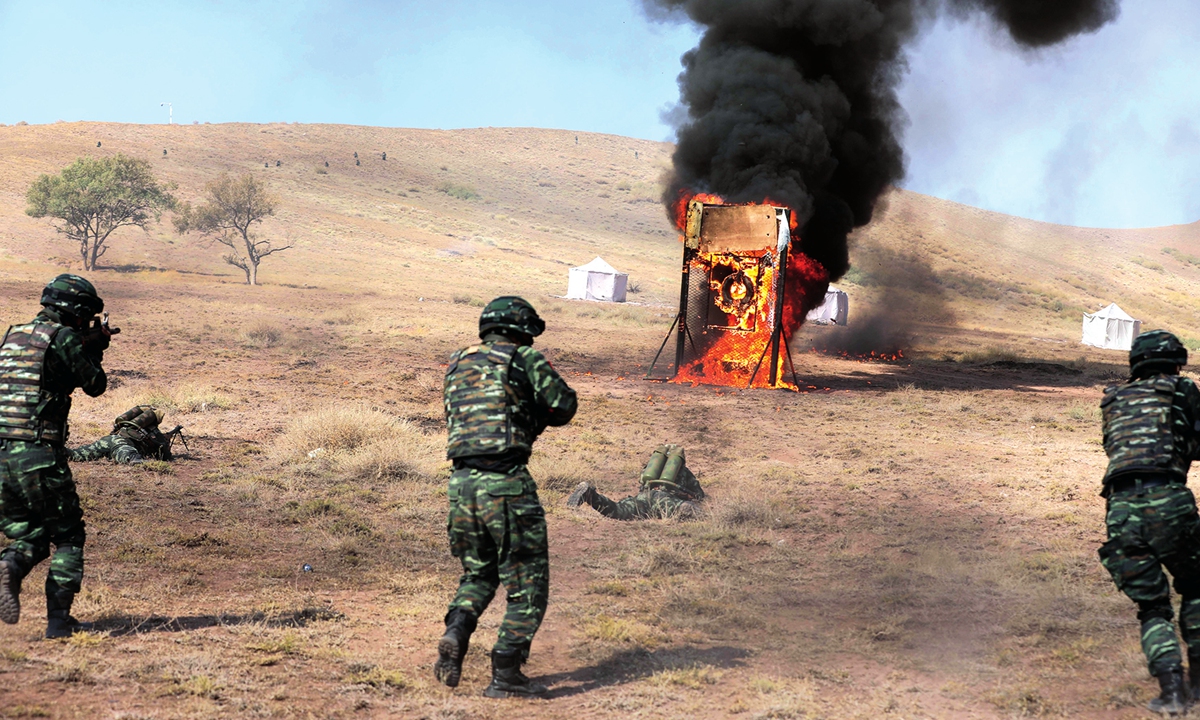
In the Middle East, many Xinjiang separatists gather in Turkey, Chinese observers said. They estimate that there are dozens of anti-China secessionist groups of different scales in the country, busy planning and organizing terrorism-like actions targeting China under the prevailing pan-Turkic sentiment.
The Turkish court's rejection of delivering Abudukadir Yapuquan to China has triggered more secessionist rhetoric among Uygur terrorists. Hidayatullah Oguzkhan, a Turkish extremist openly told the media that the court's decision "means that Turkey is moving in the direction of East Turkestan."
"Many separatists and extreme organizations related to China's Xinjiang also regard Turkey as a springboard to enter Europe," Cao told the Global Times.
Chinese State Councilor and Chinese Foreign Minister Wang Yi visited Turkey in March. When meeting with Wang, Turkish Foreign Minister Mevlut Cavusoglu said that Turkey has always abided by the one-China principle and is committed to elevate Turkey-China strategic cooperative ties.
He vowed that his country will never get involved in any action hostile to China, while prohibiting violent terrorist acts against China on its territory.
"But some Turkish politicians have gone back and forth with regard to Xinjiang-related issues - they sometimes tried to provoke China, as they boasted to be the protector of the 'Turkic-speaking peoples' in order to pander to the West," Cao said. He also emphasized that the attitude not only affects Turkey's international image, but also gives further space for separatists from Xinjiang to expand.
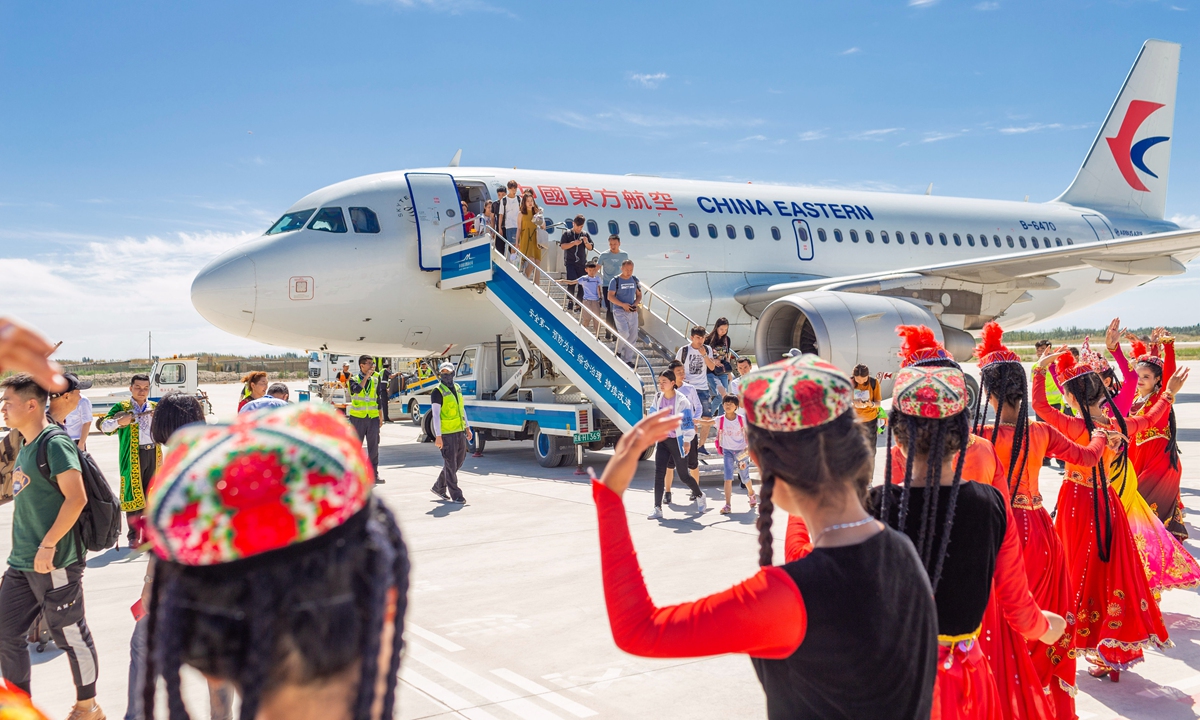
Western-backed
The rampant behaviors of Xinjiang secessionists in confronting China are closely related to the US-led Western anti-China forces. The Global Times found that some Western governments, as well as government-backed organizations, institutions and foundations, have frequently supported the Xinjiang-related separatist groups, openly challenging the one-China principle.
The US, claiming that it's itself a victim of terrorism, is actually quite indulgent with these anti-China terrorist groups.
The ETIM, for instance, is an extremist, terrorist and separatist organization that challenges China's sovereignty and stability in Xinjiang. The UN Security Council Al-Qaida Sanctions Committee has listed ETIM as a terrorist organization since 2002. In 2004, the group changed its name to the Turkistan Islamic Party (TIP).
The ETIM, or TIP, has further strengthened its ties with the US in recent years. In 2020, the US ambassador to Turkey met with head of the local ETIM branch. In November of the same year, the US revoked its designation of the ETIM as a terrorist organization, as the US State Department report stated there was no evidence that ETIM was still active, in an attempt to whitewash the movement.
After the US' de-blacklisting decision, the TIP issued two statements vowing to be a National Liberation Movement and will continue to be hostile to China rather than the West.
The ETAA in Australia, as the Australian Alert Service's article on April 21 revealed, has enjoyed escalating support from several anti-China parliamentarians, "...particularly independent South Australian Senator Rex Patrick, who headlines at ETAA protests and is leading a petition demanding Australia ban imports from Xinjiang," it exampled. Patrick was also seen "holding separatist signs reading 'it's East Turkistan … It's not Xinjiang'" together with "ETAA demonstrators," it added.
For Australian politicians to accept ETAA's claims of persecution without question, and ignore the context of those claims, ...is a dangerous precedent, and extreme hypocrisy, the article criticized.
The foundation National Endowment for Democracy (NED), one of the CIA's infamous "white glove" groups, has long been supporting Xinjiang separatist forces including the WUC.
On March 31, the US-based independent news outlet The Grayzone revealed that an anti-China organization named the Uyghur American Association (UAA), which is the US-affiliate of WUC, is funded by the NED and "works closely with Washington and other Western governments to escalate hostilities against China."
According to the article titled "Wipe out China!" US-funded Uyghur activists train as gun-toting foot soldiers for empire, NED has been central to the rising international prominence of the Uygur separatist movement. In 2020, the NED boasted that it has given Uygur groups $8,758,300 since 2004 (including $75,000 in annual funding to the UAA).
NED published its funding details in 2020 on its official website in late February. It has splashed more than $10 million a year to split and subvert China. It gave around $1.25 million to support Xinjiang secessionists and spread rumors about Xinjiang, with $400,000 to WUC.

Governments of different Western countries have various political intentions which are in line with their own national interests, Xu said.
"Take the relationship between the UAA and the US government as an example. The UAA needs financial and moral support from the US, and the American government regards the association as an opportunity to intervene in Xinjiang-related issues, so as to attain its conspiracy of containing and dividing China," he added.
For the UK, by declaring "genocide" in China's Xinjiang, it wants to get closer to the US, especially after Brexit, Xu analyzed. "As for the Czech Republic and Lithuania, they want to move closer to the Western camp and act as a pawn," he told the Global Times.
Facing the Western world's rumors and attacks against Xinjiang, Xu suggests China should continue developing regional economy and promoting exchanges between Xinjiang and other parts of China to safeguard the internal stability and ethnic unity in Xinjiang.
"As for rumors hyped by the West, we should encourage more Chinese media, scholars and diplomats to stand out and refute these rumors, telling the truth with solid evidence," he added.
On the evening of April 25, WUC hosted a so-called "Uygur-Han international online video seminar," inviting several Taiwan separatists. As the media reported, their discussion mainly focused on their stand against the governance of the Communist Party of China in order to undermine the unity of all ethnic groups in China under the guise of "human rights."
Dolkun Isa, head of WUC, also delivered a pre-recorded video message to the foundation event of "Taiwan Parliament Group for Uyghur" on April 23, which was founded by a member of Taiwan's legislative authorities Freddy Lim, joined by a group of 30 members from the legislative authorities in the Taiwan region.
In the video, Dolkun Isa said he expected to "visit Taiwan again in the near future."
In Turkey, a court caused public anger among Chinese people for refusing China's extradition request for Abudukadir Yapuquan, a prominent terrorist from the East Turkistan Islamic Movement (ETIM), and further removing judicial control measures and outbound restrictions on him, the Xinhua News Agency reported on April 13.
The ETIM is a terrorist organization listed by the UN Security Council and is recognized as such by Turkey, Chinese Foreign Ministry spokesperson Zhao Lijian said at a press briefing in April. Abudukadir Yapuquan, who has plotted terrorist attacks on Chinese territory many times, is one of the initiators of the ETIM, Zhao noted.
In Australia, the Australian Alert Service, the weekly publication of the Australian Citizens Party, revealed that local anti-China politicians colluded with the East Turkistan Australian Association (ETAA) in defaming China in an article it published online on April 21.
Titled Australian politicians back 'East Turkistan' terrorism apologists, the article pointed out that this terrorist group is "loudly backing the current campaign for Australia to fall in behind its Five Eyes partners the USA and Canada and label China's treatment of its Uygur minority as 'genocide'." Australian authorities should not take ETAA's claims of "genocide" and "persecution" at face value, "but at least demand real proof," the article noted.
Apart from the WUC, ETIM and ETAA, many Xinjiang-related separatist and terrorist groups, under the guise of "protecting human rights" and "safeguarding the interests of the Uygur people," get financial or political support from some countries and regions who have common political interests with the anti-China politicians, said Xu Jianying, a research fellow at Chinese Borderland Research Institute of the Chinese Academy of Social Sciences.
The recent barrage of attacks on China's Xinjiang region in the Western world, for instance, is the result of collusion between Xinjiang separatists and Western anti-China forces in an attempt to defame China, observers pointed out.

Xinjiang International Grand Bazaar in Urumqi. Photo: IC
Make waves
Some right-wing politicians in Eastern Europe, together with Xinjiang secessionist forces, have been slandering the Xinjiang region in the past few weeks with lies and rumors including "genocide" and "forced labor."
On 22 April, the Lithuanian Parliament held a human rights discussion that included topics on so-called "Uygurs repressions" in Xinjiang that Lithuania is considering recognizing as a "genocide." The discussion invited Rayhan Asat, a "Uygurs representative" who is active in the Western media, to tell the absurd story of "at least one million people being illegally imprisoned and subjected to forced labor."
Lithuanian MP Dovile Sakaliene claimed to local media that she and other MPs have received "very strict, categorical and pressuring letters from the Chinese Embassy."
The Global Times found that Sakaliene was one of the founders and leaders of the Inter-Parliamentary Alliance on China (IPAC), an organization trying to unite parliamentarians from around the world to boycott China based on the affairs as Xinjiang, Tibet and Hong Kong. The IPAC's central secretariat on human rights is a Uygur singer and the UK Project Director for the WUC
The IPAC said that the British Parliament's recognition of the Chinese government's "genocide" in Xinjiang is the latest in a series of actions coordinated by IPAC members, and they will continue to promote similar initiatives in other European parliaments.
WUC also has close ties with anti-China "scholars." At the end of 2018, a group of 115 Czech and Slovak "scholars" and public figures appealed to the Chinese government to shut down "political re-education camps" in Xinjiang, media reported.
Ondrej Klimes, a researcher in China politics at the Czech Academy of Sciences' Oriental Institute, is one of the scholars who keeps babbling about Chinese government's policies in Xinjiang. In a latest article published on March 15, Klimes claimed that China's "repression" on the Uygurs in Xinjiang reflects "the Chinese state's extreme methods of governance and power projection abroad."
"In recent years, some Eastern European countries have begun to hold a hostile attitude and put pressure on China by supporting some anti-China forces with focus on Xinjiang and Taiwan related issues. This has given Xinjiang secession forces an opportunity to expand their activities," Cao Wei, an expert on security studies at Lanzhou University, told the Global Times.
The current mushrooming of the Xinjiang secession forces in Eastern Europe is also partly linked to the continued transfer of some of the ETIM terrorists originally held in Guantanamo prison to the Balkans after the war in Afghanistan. This must have laid the foundation for local connections of the extremist forces, Cao noted.
"The irresponsible behavior of the US in the past has sown the seeds of trouble, and some Eastern European countries are now playing the political card under the pretext of human rights and freedom," Cao remarked.

The joint drill "Cooperation-2019" held by the Chinese People's Armed Police Force (PAP) and the National Guard of Kyrgyzstan in August 2019 in Urumqi. Photo: Xinhua
In the Middle East, many Xinjiang separatists gather in Turkey, Chinese observers said. They estimate that there are dozens of anti-China secessionist groups of different scales in the country, busy planning and organizing terrorism-like actions targeting China under the prevailing pan-Turkic sentiment.
The Turkish court's rejection of delivering Abudukadir Yapuquan to China has triggered more secessionist rhetoric among Uygur terrorists. Hidayatullah Oguzkhan, a Turkish extremist openly told the media that the court's decision "means that Turkey is moving in the direction of East Turkestan."
"Many separatists and extreme organizations related to China's Xinjiang also regard Turkey as a springboard to enter Europe," Cao told the Global Times.
Chinese State Councilor and Chinese Foreign Minister Wang Yi visited Turkey in March. When meeting with Wang, Turkish Foreign Minister Mevlut Cavusoglu said that Turkey has always abided by the one-China principle and is committed to elevate Turkey-China strategic cooperative ties.
He vowed that his country will never get involved in any action hostile to China, while prohibiting violent terrorist acts against China on its territory.
"But some Turkish politicians have gone back and forth with regard to Xinjiang-related issues - they sometimes tried to provoke China, as they boasted to be the protector of the 'Turkic-speaking peoples' in order to pander to the West," Cao said. He also emphasized that the attitude not only affects Turkey's international image, but also gives further space for separatists from Xinjiang to expand.

People in Kuqa county in Xinjiang hold a warm welcome ceremony for tourists with singing and dancing on July 11, 2019. Photo: IC
Western-backed
The rampant behaviors of Xinjiang secessionists in confronting China are closely related to the US-led Western anti-China forces. The Global Times found that some Western governments, as well as government-backed organizations, institutions and foundations, have frequently supported the Xinjiang-related separatist groups, openly challenging the one-China principle.
The US, claiming that it's itself a victim of terrorism, is actually quite indulgent with these anti-China terrorist groups.
The ETIM, for instance, is an extremist, terrorist and separatist organization that challenges China's sovereignty and stability in Xinjiang. The UN Security Council Al-Qaida Sanctions Committee has listed ETIM as a terrorist organization since 2002. In 2004, the group changed its name to the Turkistan Islamic Party (TIP).
The ETIM, or TIP, has further strengthened its ties with the US in recent years. In 2020, the US ambassador to Turkey met with head of the local ETIM branch. In November of the same year, the US revoked its designation of the ETIM as a terrorist organization, as the US State Department report stated there was no evidence that ETIM was still active, in an attempt to whitewash the movement.
After the US' de-blacklisting decision, the TIP issued two statements vowing to be a National Liberation Movement and will continue to be hostile to China rather than the West.
The ETAA in Australia, as the Australian Alert Service's article on April 21 revealed, has enjoyed escalating support from several anti-China parliamentarians, "...particularly independent South Australian Senator Rex Patrick, who headlines at ETAA protests and is leading a petition demanding Australia ban imports from Xinjiang," it exampled. Patrick was also seen "holding separatist signs reading 'it's East Turkistan … It's not Xinjiang'" together with "ETAA demonstrators," it added.
For Australian politicians to accept ETAA's claims of persecution without question, and ignore the context of those claims, ...is a dangerous precedent, and extreme hypocrisy, the article criticized.
The foundation National Endowment for Democracy (NED), one of the CIA's infamous "white glove" groups, has long been supporting Xinjiang separatist forces including the WUC.
On March 31, the US-based independent news outlet The Grayzone revealed that an anti-China organization named the Uyghur American Association (UAA), which is the US-affiliate of WUC, is funded by the NED and "works closely with Washington and other Western governments to escalate hostilities against China."
According to the article titled "Wipe out China!" US-funded Uyghur activists train as gun-toting foot soldiers for empire, NED has been central to the rising international prominence of the Uygur separatist movement. In 2020, the NED boasted that it has given Uygur groups $8,758,300 since 2004 (including $75,000 in annual funding to the UAA).
NED published its funding details in 2020 on its official website in late February. It has splashed more than $10 million a year to split and subvert China. It gave around $1.25 million to support Xinjiang secessionists and spread rumors about Xinjiang, with $400,000 to WUC.

Foreign diplomats delegation comprising Vladimir Norov, secretary-general of the Shanghai Cooperation Organization (SCO), and more than 30 diplomats from 21 countries visit a resident in Nazarbagh town of Kashi in Xinjiang on March 31, 2021. Photo: Xinhua
Governments of different Western countries have various political intentions which are in line with their own national interests, Xu said.
"Take the relationship between the UAA and the US government as an example. The UAA needs financial and moral support from the US, and the American government regards the association as an opportunity to intervene in Xinjiang-related issues, so as to attain its conspiracy of containing and dividing China," he added.
For the UK, by declaring "genocide" in China's Xinjiang, it wants to get closer to the US, especially after Brexit, Xu analyzed. "As for the Czech Republic and Lithuania, they want to move closer to the Western camp and act as a pawn," he told the Global Times.
Facing the Western world's rumors and attacks against Xinjiang, Xu suggests China should continue developing regional economy and promoting exchanges between Xinjiang and other parts of China to safeguard the internal stability and ethnic unity in Xinjiang.
"As for rumors hyped by the West, we should encourage more Chinese media, scholars and diplomats to stand out and refute these rumors, telling the truth with solid evidence," he added.
